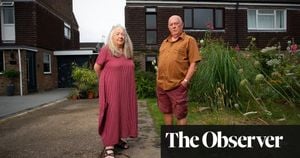British farmers have made their presence known, gathering en masse outside the Houses of Parliament to protest against new inheritance tax regulations which they fear could threaten the survival of family-run farms across the United Kingdom. Over 10,000 farmers took to the streets on November 19, 2024, brandishing banners with slogans like "No farmer, no food, no future" and "Starmer the farmer harmer," calling for the Labour government to reconsider its recent tax reforms.
The contested tax measures were introduced as part of the Labour government's budget and are dubbed by critics the "tractor tax." This new legislation, set to take effect from April 2026, mandates a 20% inheritance tax on agricultural properties valued over £1 million (approximately $1.27 million), compared to the previous exemption for agricultural land transfers which allowed 100% relief. Farmers argue this policy will lead to the inevitable sale of their family lands, which have been cultivated for generations.
Olly Harrison, one of the protesting farmers, emphasized the dilemma many face: "We're not tax dodgers. If we were making profits, tax our profits. But if we’re not making profits, we can’t pay inheritance tax." This sentiment was echoed by Emma Robinson, who hopes to pass down her farm, which has been cared for by her family for 500 years. She lamented, "Now it's being taken out of my hands by someone that's been in Parliament for literally days."
The government's stance has been firm; they maintain the tax changes are necessary for bolstering public finances. According to officials, approximately 500 farms may be affected based on inheritance data from 2021-2022, but farmers counter this claim, highlighting estimates from the Country Land and Business Association proposing over 70,000 farms could be hit by the new tax due to their worth exceeding the threshold.
Tom Bradshaw, president of the National Farmers’ Union, stated, "We cannot have a policy in place which has such disastrous human impacts and think we're going to go quiet." His assertion reflects the defiance within the farming community. He stressed the need for policies encouraging sustainable agriculture and secure family farms, particularly at a time when agricultural profitability is already under pressure from climate change and the fallout from Brexit.
Despite the protest's intensity, the government reiterated its belief the majority of farmers will remain unaffected, with adjustments allowing exemptions for family properties and additional allowances for couples raising the threshold to as high as £3 million. Prime Minister Keir Starmer has been adamant, declaring, "The vast majority of farms will not be affected."
The backlash against the tax plans isn’t limited to farmers alone—various community members from rural backgrounds joined them, as well as public personalities like television star Jeremy Clarkson. During the protest, Clarkson labeled the tax changes as "a hammer blow to the back of the head" for farmers, imploring the government to reconsider as he stated, "If this carries on, there won't be a next generation of farmers."
Many farmers fear the proposed tax reforms will directly affect local food production and security. Tom Morphew from Full Circle Farms expressed urgent concerns about food dependency on overseas markets—should domestic farming decline due to high taxation—suggesting dire repercussions for food prices and availability if international supply chains were disrupted. He said, "We’re going to rely on food from Peru, Spain, or Portugal—and when they have a flood or war, we won’t get the food. It will go to their people first and we'll be stuffed and food prices will soar."
Adding to the complexity of this situation, the protests have sparked discussions about the health of the agricultural sector, which is under considerable strain from external pressures, including fluctuated subsidies post-Brexit and rising operating costs due to climate change impacts. Agriculture makes up less than 1% of the UK economy, yet it provides around half of the food consumed by British households and employs nearly half-a-million individuals. With labels like "betrayal" being thrown at the government's decision, the tension is palpable, calling for ear to ground conversations between the agricultural community and policymakers.
Chancellor Rachel Reeves' budget proposal which first introduced these inheritance tax alterations was framed as part of wider efforts to rectify perceived fiscal imbalances, particularly in estates with extravagant property valuations. Critics state, though, it merely illuminates and exploits socioeconomic divides, thereby endangering the continuity of family-run agriculture—a foundation upon which British rural life is built.
These environmental and economic concerns resonate outward, as similar agricultural protests have been cropping up across Europe, raising the stakes for the UK's Labour government. The discontent observed among UK farmers parallels mounting frustrations present within rural sectors throughout the continent, where farmers advocate for consideration and appreciation of their industry's struggles, and when neglect and taxation become prime concerns, unrest and calls for action are inevitable.
The future of family farms remains uncertain, and as farmers continue to voice their apprehension, they are left questioning the extent to which policy decisions reflect the needs of those who contribute to the nation’s food security and rural landscapes. The question now lies squarely with the government: will they heed the warnings of the rural communities, or ignore them at their own peril?



